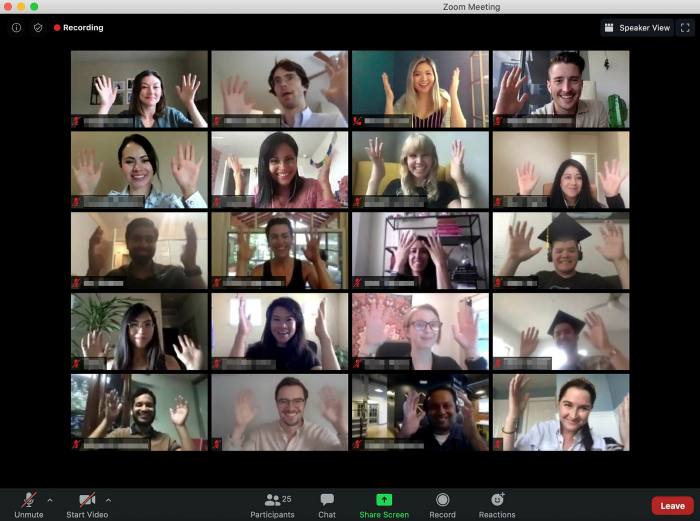As universities closed their school rooms and firms adjusted to the disruption of the coronavirus pandemic last calendar year, PepsiCo’s chief discovering officer, Molly Nagler, had to scrap options to send executives to programmes at Wharton School and Yale School of Management.
But relatively than dismiss govt instruction as impractical, unaffordable or unjustifiable for the duration of a disaster, Nagler doubled down and negotiated on the web solutions for the US-based food items and beverages team.
“We are inclined to use the in-human being, campus-based programme for executives to build a differentiated working experience and expose them to chopping-edge thinking and exploration,” she suggests. “We’ll nevertheless use the campus for elite activities but much less than in advance of mainly because of the expenditure and the problem to get absolutely everyone in a single place.”
Like several of her counterparts in firms close to the environment, Nagler is not chopping again on her teaching spending budget. As an alternative, she is reconsidering who should discover, what they should study and how ideal to practice them — and reviewing her option of exterior programmes.
Coronavirus imposed a sharp shock on business enterprise schools’ non-diploma “open” courses for administrators and bespoke “custom” offerings for corporate consumers. Whilst demand for skills these types of as the MBA has held up properly, the international university-based govt instruction market place, worthy of close to $2bn in 2019, fell by a third in 2020.
François Ortalo-Magné, dean of London Business enterprise School, suggests its govt programmes generated £50m a calendar year in advance of Covid-19, but that volume has considering that halved. “The pandemic has not been quick,” he suggests.
Michael Malefakis, head of govt programmes at Wharton, agrees it has been a really tough time: “We’ve pushed ourselves and the market place has pushed us much from our previous convenience zone. It is made us rethink how we framework and supply instruction in a way that has not been as radical considering that environment war two.”
The fantastic news for instruction companies is that appetite continues to be sturdy. Mark Roberts, associate dean of govt instruction at Insead, draws a contrast with the 2008 fiscal disaster, when teaching programmes had been witnessed as “something you swap off as an expenditure in a knee-jerk way”. He adds: “We haven’t witnessed that this time. A little something basic has shifted strategically.”

Also, Nuno Gonçalves, chief discovering and improvement officer at Mars, has not witnessed his spending budget fall. “Every strategic paper I see talks about ‘people capabilities’, about what we want tomorrow,” he suggests. “If we want to be profitable, we want to have these capabilities.” Along with “hard skills” centered on electronic transformation and analytics, Gonçalves sees demand for the “soft skills” that foster leadership traits these types of as empathy — and how to harmony them with the continuing want for professional success.
Josh Bersin, a US corporate discovering specialist, agrees that coronavirus has centered firms on “people issues” and away from administration philosophies. “It’s about human-centred leadership which is far more caring,” he suggests. Tied to this is range and inclusion, topics that are “on employees’ minds, reporters’ minds, these of rankings, with clients determining not to buy solutions from firms that are not currently being reasonable. We have identified range has barely been resolved, and if something we have been backsliding.”
Along with the acquisition of distinct skills, teaching programmes offer a break from the relentless pressures of day-to-day operate in lockdown. “Companies are searching for meaningful engagements for employees that are not just about operate or a Zoom celebration,” suggests Ortalo-Magné of London Business enterprise School. “We have provided time for contributors to chat with our school to provide them indicating as properly as discovering.”
What do you think?
The FT would like to hear from chief discovering officers about their sights on topics, budgets and techniques of discovering. Remember to total our short study at ft.com/closurvey by March 5. The effects will sort aspect of our Government Schooling report in May well.
Matt Confer, a vice-president at Abilitie, a company which features teaching these types of as business enterprise simulations, suggests several consumers are fascinated in teaching mainly because it assists with personnel retention and enthusiasm. “People have been at household far more than any of us required or expected and we’re getting burnt out,” he suggests.

Founded in 2015, Abilitie — which now features a mini on the web MBA — claimed its ideal two fiscal quarters in the 2nd 50 percent of last calendar year.
Whilst facial area-to-facial area conferences can build a prosperous discovering working experience not generally replicable on the web, electronic seminars, courses and activities make it less complicated to draw in the two higher-profile exterior speakers, these types of as busy chief executives, and consumers who struggle to choose time off for comprehensive-time study. Know-how has also established much less overwhelming means for contributors who are shy to talk out.
Digitisation raises a broader problem for corporate discovering officers about the “democratisation” of teaching. Whilst highly-priced on-campus programmes had been commonly constrained to a little team of senior executives, on the web discovering can supply a broader vary of teaching far more cheaply and competently to a much much larger selection of personnel at diverse stages in an organisation.
FT study: Are you a doing the job guardian? How has the pandemic impacted you?

The pandemic has turned everyone’s life upside down, but it has been specifically disruptive for several mother and father as they juggle operate, housework and homeschooling. We want to know how it has been for you.
Remember to fill out this sort. Your participation will be integral to our reporting.
Erin Clark, practice chief for leadership improvement and discovering at skilled expert services company Deloitte, suggests: “It’s about leadership at all stages — a thing that can no for a longer time be reserved for the choose few. Financial commitment in creating leaders was disproportionately anchored in hierarchy. Digital discovering features the possibility to be extensively offered.”
The demand for on the web teaching is intensifying the competitiveness in between business enterprise colleges and alternative companies of govt instruction — firms which may perhaps have much less educational heritage but which can be far more nimble. Deloitte, like other consultancies, recruiters and professional firms, as properly as on the web educators from Abilitie to Coursera, are expanding.
Andrew Crisp, co-founder of the instruction consultancy CarringtonCrisp, suggests the pandemic “is the end of luxurious discovering, with the board at a 5-star lodge for a weekend”. Business enterprise colleges, he thinks, “are heading to have to sharpen up mainly because the new entrants are far more fleet of foot in responding to customers”.
But Ravi Kumar, president of Infosys, sees a continuing want for engagement with universities, as they refocus on life-extended discovering. “They will have to pivot,” he suggests. “Executive instruction was about refreshing what you had learnt. Now discovering is about switching from a single occupation or career to a different. Schooling and operate will be intertwined.”
The deserves of the digital classroom

Just when Sumit Tomar was because of to commence an highly developed finance program at Wharton School in March last calendar year, the pandemic pushed his govt teaching fully on the web.
But the electrical engineer, who life in San Diego, has no regrets. “The digital classroom serves my wants correctly,” he suggests. “With the time variation, I can study from six.30am until 11am and then have ample time to do my day career till 8pm. If I have some urgent operate, I can walk out and occur again to check out the lectures all over again in the evening.”
Quite a few business enterprise colleges have suffered setbacks to their highly developed administration programmes, with applicants discouraged by the pressured shift to electronic discovering. But Tomar was satisfied to spend the comprehensive $67,000 fee and keep away from the inconvenience and charges of travel. “It’s not low-priced but it was undoubtedly worthy of the revenue.”
Tomar is chief govt of pSemi, a semiconductor company. He suggests Wharton’s program, moreover a previous a single in standard administration at Stanford a 10 years back, had been a substitute for an MBA.
“I could never ever envision finding out comprehensive time: which is two decades, a good deal of revenue invested and you are out of operate. Whilst I’m doing the job, I’m discovering in parallel and implementing lessons in the serious environment.”
He admits that “the bonds you make in human being are not the identical matter as a digital cling-out”, but that the electronic format has made it achievable to draw in higher-top quality contributors from close to the environment, as properly as primary business enterprise figures willing to talk to his lessons on the web.
He predicts the on the web format will help strengthen the posture of primary colleges. “Even if the pandemic is above, the digital classroom will not go away,” he suggests.





More Stories
Transform Your Bathroom: The Beauty of Glass Shower Enclosures
The Role of Advertising Agencies for Promoting Businesses
Know The Efficiency Of Banner Advertising